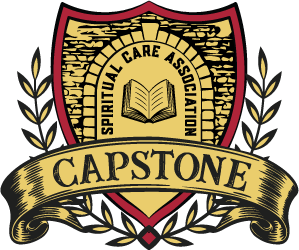
THE ANDREW E. SLABY MD, PHD, MPH
SCHOOL OF SPIRITUAL CARE

School of Spiritual Care
Doctor of Theology in Spiritual Care
Master of Theology in Spiritual Care
The CAPSTONE School of Spiritual Care is for those of all caregiving disciplines, settings, and roles who desire to specialize in a spiritual care Degree.
The degrees will provide an overview of spirituality and religion, the benefits of spiritual care, spiritual distress, spiritual screening, and spiritual conversations, as well as interventions.
The school of Spiritual Care provides the skill set and knowledge to understand the scope of spirituality and integrate appropriate and ethical care into professional practice. It is intended for students from a variety of professions including medical (nursing, physicians, social work, occupational, physical and other therapies, and other allied health) and community-based (counselors, community leaders, non-chaplain first responders).
Intended for both non-chaplains and professional chaplains, and many others, the Spiritual Care Degrees integrate two documents prepared by panels of international experts. The Quality Indicators outline the competencies and metrics to ensure that professional care is provided, the metrics that indicate such care is present, and evidence-based tools to measure that quality. The Scope of Practice includes 18 indicators which create the set of competencies required of professional chaplains. These two documents also provide the framework for the integration of spiritual care.
The School of Spiritual Care Learning Outcomes:
- The body of knowledge in the field of spiritual care, including the related cultural, technological, ethical, and professional competencies.
- Skills of critical thinking and analysis by Investigating, generating, and synthesizing complex ideas and concepts at an abstract and/or applied level, critically evaluating contemporary debates and literatures in their field of study, and analyzing problems or issues, articulating appropriate solutions and justifying propositions and/or professional decisions.
- Oral and written communication skills, including the academic and technical writing skills, and applying enquiry-based learning and ways of thinking to new disciplinary and/or professional contexts and communicating complex ideas in a variety of formats to diverse audiences.
- Effective collaboration with peers, colleagues, and communities by demonstrating a high level of personal autonomy and accountability in the acquisition or application of knowledge or skills and an understanding of, and the ability to apply, the principles of teamwork and collaboration.
- Equity and diversity as these apply to effective spiritual care integration and practice.
- Knowledge and skills of leadership and advocacy as applied to spiritual care.
- The organization, implementation, interpretation, and analysis of research appropriate to the field of spiritual care.
